YOU ARE WHAT YOU EAT
Sports injuries can disrupt your workout program for weeks, months, or even keep you in the stands for an entire season. Help reduce your risk of injury with a proper training diet that includes a wide variety of nutrient-dense whole foods that support bones, joints, muscles, tendons, and other connective tissues. Mix these tips into your nutrition plan to support your active lifestyle.
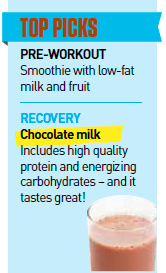 FUEL YOUR PERFORMANCE
FUEL YOUR PERFORMANCE
Eat sufficient carbohydrates and protein
Carbohydrates are the preferred fuel source to support exercise, while protein is vital for muscle maintenance, growth and repair.
When carb stores are low, the body resorts to breaking down muscle protein to use as fuel, which can lead to decreased strength and damage muscle tissue. Muscle protein breakdown occurs in endurance and strength training activities, making adequate intake of high quality dietary protein a must.
For active individuals, studies show the amount and timing of protein consumption are important to maximize growth and repair. Help prevent injury: fuel up with carbs and protein one to two hours before your workout and within 30 minutes after.
KEEP YOUR STATS AFLOAT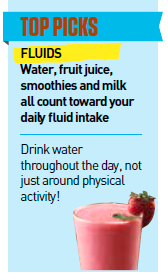
Track your hydration status
A dehydrated joint is more susceptible to tears and other injuries. Even worse, dehydration causes stress on the entire body leading to increased internal temperature, increased heart and sweat rates, early fatigue, and loss of balance and mental focus.
Make sure to stay hydrated throughout the day so that you’re ready to perform when the game is on your stick late in the third. Help prevent dehydration: drink fluids before, during and after you hit the ice or the gym.
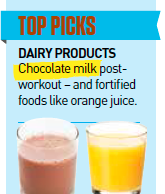 DON’T CRACK UNDER PRESSURE
DON’T CRACK UNDER PRESSURE
Maximize calcium and vitamin D intake
Thwarting off stress fractures in your bones is critical to the prevention of other exercise-related injuries. Get adequate amounts of calcium and vitamin D each day to help develop and maintain a strong frame, so you’re prepared to win even the toughest puck battles.
Studies show that athletes who consume low-calcium diets tend to have lower bone mineral density (BMD) and an increased risk for stress fractures.
HELP YOUR TICKER 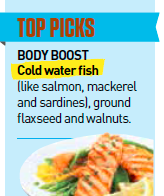
Incorporate heart-healthy essential fats
Dietary fats provide essential fatty acids that the body cannot make on its own. Essential fatty acids – like omega-3s found in certain fish and grains – are needed to make and repair cell membrane.
But the benefits don’t end there. Fatty acids also help lubricate your joints and tissues, reduce inflammation, are good for the heart and serve as a huge source of energy – giving your body the boost it needs when the clock starts to wind down.
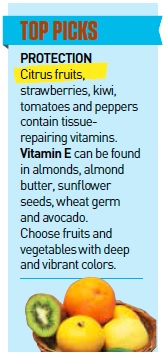 STOCK UP ON ENFORCERS
STOCK UP ON ENFORCERS
Ramp up antioxidant levels to protect your body
Vitamins C and E are injury-preventing antioxidants that help protect your body’s cells from damage. The combination of these vitamins is thought to minimize damage from exercise, helping with recovery after on and off-ice sessions.
Vitamin C plays a role in tissue repair and formation of collagen, which holds bone together and provides strength and flexibility for ligaments and tendons. Vitamin E helps protect tissues and organs from damage caused by free radicals.
INJURY-PREVENTING SNACKS AND MEALS
Fill your plate with whole grains, dark green vegetables and red, purple, and blue fruit, low-fat dairy products and healthy fats. And stay hydrated!
Pre-Workout
- Power House Smoothie (milk, blueberries, strawberries, banana, kale and ground flax seed)
- Almond butter sandwich | Strawberries| Milk
- Meat or cheese sub loaded with veggies | Milk or fruit juice
Post-Workout
- Chocolate milk |walnuts
- Yogurt, low fat granola and berries
- Salmon sandwich | Fruit cup| Milk
- Lentil soup with rice | Yogurt | Fruit salad| Milk, juice or water







